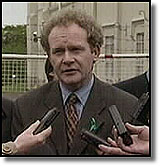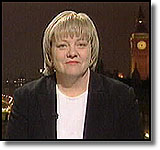
|
Government Resumes Talks With Sinn FeinFor the first time since the IRA abandoned its ceasefire in February 1996, senior British civil servants have met with leading representatives of Sinn Fein, the IRA's political wing.As the two sides met, the Prime Minister, Tony Blair, warned in the Commons that there was no question of Sinn Fein participating in multi-party talks on Northern Ireland whatsover unless there was "a clear, credible and unequivocal ceasefire". After three hours of discussions at Stormont Castle in Belfast, Sinn Fein's chief negotiator, Martin McGuinness, said it was still "too soon to say" if the two sides had resolved their differences. He added that they had had "very in depth discussions". Both sides would now reflect and see how the situation could be moved forward. Mr McGuinness and his three colleagues met the same civil servants they had talked with before the IRA ceasefire ended the dialogue. "It was important to build on solutions to resolve the conflict. The problem over the past couple of years had been that the previous administration believed there was a militaristic solution," said Mr McGuinness. "I now hope we are going to get a British Government which recognises that the problems we have to solve are political problems," he continued.
"There is movement in the clarification process," said Ms Mowlam. With multi-party talks on Northern Ireland's future due to resume in Belfast on June 3, she said she did not think it was possible Sinn Fein would be involved by then. On Thursday, Ms Mowlam will fly to Washington to brief the Clinton Administration on the state of the peace process. But if there was an unequivocal declaration of a ceasefire the Government would move without undue delay, she added. For the Government, the key aim is to establish whether Sinn Fein is genuinely committed to a political solution in Northern Ireland. For its part, Sinn Fein wants assurances on a range of questions. It wants to know whether it will gain immediate access to multi-party talks if the IRA declares an unequivocal ceasefire. Sinn Fein wants to know if there will be a time-frame for the negotiations. And it wants to clarify whether the government is prepared to take any measures to ensure that the issue of the decommissioning of weapons, which deadlocked the last round of negotiations, will not delay progress this time. Sinn Fein is also likely to demand some confidence-building measures, such as the early release of Irish republican prisoners. The government came in for criticism from the Ulster Unionist MP Ken Maginnis, who described the timing of the meeting - on the same day as local elections - as "malicious". he said: "This exercise and the related television pictures is worth 25,000 votes to Sinn Fein and I believe that those within the Northern Ireland Office bureacracy know that." |
Diana, Princess of Wales, 1961-1997
Conference 97
Devolution
The Archive
News |
Issues |
Background |
Parties |
Analysis |
TV/Radio/Web
Interactive |
Forum |
Live |
About This Site
News |
Issues |
Background |
Parties |
Analysis |
TV/Radio/Web
Interactive |
Forum |
Live |
About This Site
© BBC 1997 |
politics97@bbc.co.uk |

